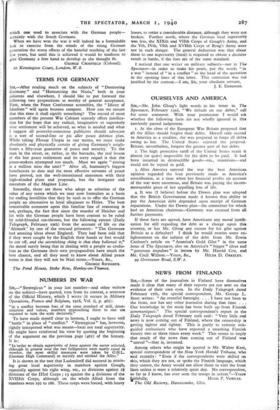OURSELVES AND AMERICA SIR, — Mr. John Gloag's light words in his
letter in The Spectator, February 23rd, " We default on our debts," call for some comment. With your permission I would ask whether the following facts are not wholly ignored in this carelessly passed judgement.
1. At the close of the European War Britain proposed that all the Allies should forgive their debts. Herself only second to America as a creditor, she was prepared to forgo all debts owing to her. The United States rejected the proposal. Britain, nevertheless, forgave the greater part of her debts.
2. The high protective tariff of the United States made it almost (or quite) impossible for the debt to be paid. It had been incurred in destructible goods—viz., munitions—and could not be repaid in gold.
3. After America entered the war the best American opinion regarded the loan previously made as America's contribution, at a time when her financial profits on account of the war were enormous, and Britain was paying the incom- mensurable price of her appalling loss of life.
4. It was (I believe) before the Dawes plan was adopted that the British Government made it known that ability to pay the American debt depended upon receipt of German reparations. Under the Dawes plan—the committee for which had an American chairman—Germany was excused from all further payments.
If these facts are agreed, have Americans any moral justifi- cation for still regarding the debt as a charge upon this country, or has Mr. Gloag any excuse for his gibe against Britain as a defaulter? I think he would receive some en- lightenment on the subject of the debt from Mr. Erwin Canham's article on " America's Gold Glut " in the same issue of The Spectator, also on America's " bigger " ideas and " generous impulses " in letters by Mr. Harold Cox, and Mr. Cecil Willson.—Yours, &c., HILDA D. OAKELEY. 99 Grosvenor Road, S.W.1.














































 Previous page
Previous page